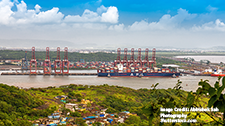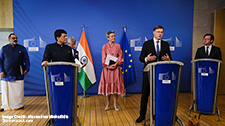Energy & Resources

Relations with greater and smaller powers in Eurasia are increasingly important to Europe and North America. Eurasia is home not only to a growing share of the world’s population, economic production and energy resources, but also to a large part of the world’s most economically dynamic and politically confident nations. Western powers, however, have often struggled to reconcile their divergent interests in relations with countries in Eurasia. On the one hand, relations have grown and developed in the areas of economic cooperation as well as security and countering crime and terrorism. On the other hand, there has been a strong normative aspect to western policy, as western powers have sought to support the spread of democracy and ensure respect for human rights, while fighting corruption abroad. A lack of coordination of these interests has often led to confusion, misunderstandings and occasional gridlock.
ISDP’s research aspires to enhance mutual understanding between states and societies in the West and in Eurasia. ISDP research on Western policy towards Eurasian countries aims to provide critical analysis, detailed assessments and pragmatic recommendations for governmental, non-profit and private sector actors.
Related News
Related Publications
-
Jagannath Panda: “India’s INSTC Commitment Is Not Reliant on Western Endorsement”
Interview conducted by Ilya Roubanis, Caucasus Watch The International North-South Transport Corridor (INSTC) is a 7,200km mostly overland network stretching from India to Russia, via Azerbaijan and Iran, branching […]
-
Navigating Uncertainty: How Multinationals Can Hedge Against Rising Tensions in the Taiwan Straits
When geopolitical tensions in critical regions can reshape the landscape of global trade overnight, multinationals are finding it increasingly necessary to adopt sophisticated risk management strategies. The Taiwan Straits, a […]
-
Intersecting Horizons: The Nexus of Maritime Security and Global Health
The maritime industry is often regarded as one of the primary engines of the global economy as it is the backbone of global trade, accounting for around 90 percent of […]
-
EU-Thailand FTA Negotiations: IUU Fishing and Human Rights Remain Obstacles
Thailand’s fishing industry, which at its height saw as many as 200,000 migrant workers from neighboring Laos, Myanmar, and Cambodia caught in a brutal system of abuse, withered global criticism […]
-
Trade, Connectivity and Supply Chains in EU-India Relations
In the decade and a half since 2007 when the EU and India first started their FTA negotiations, the world economic order has undergone a sea change. During that period, […]




